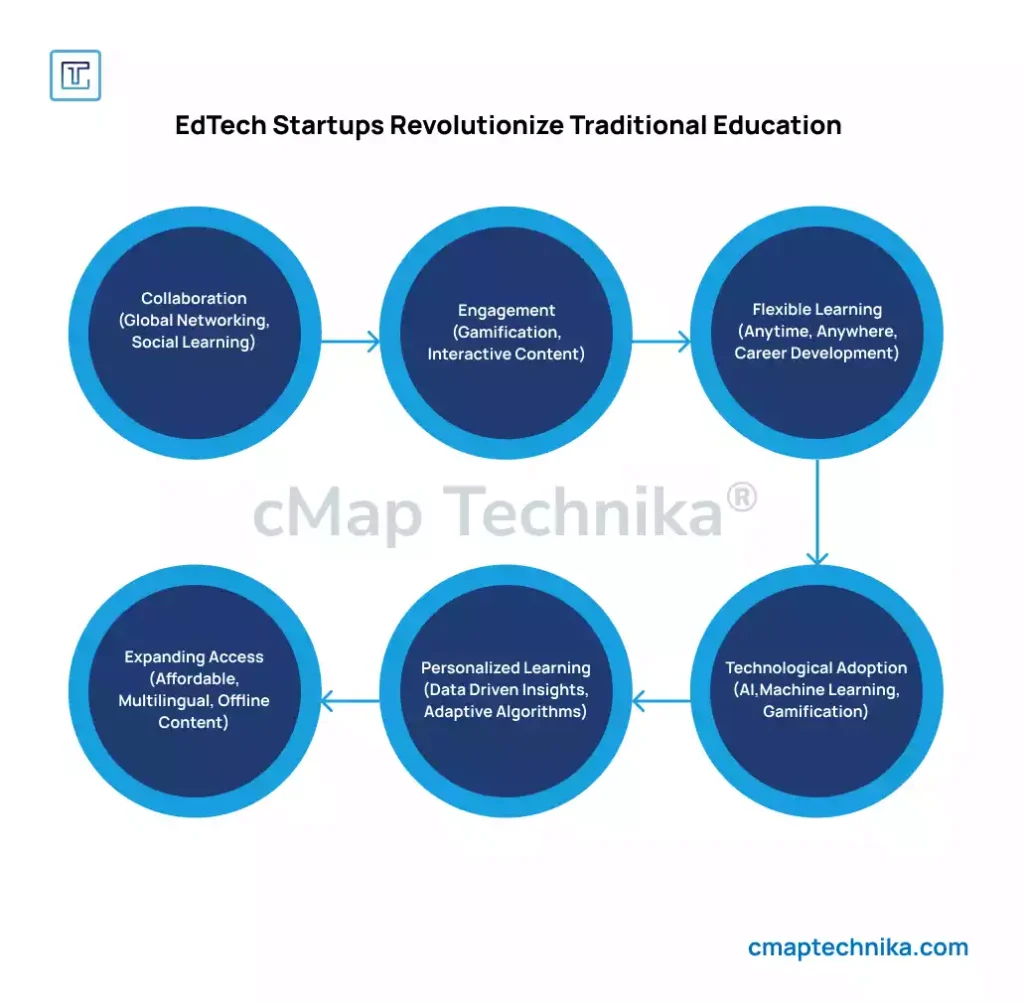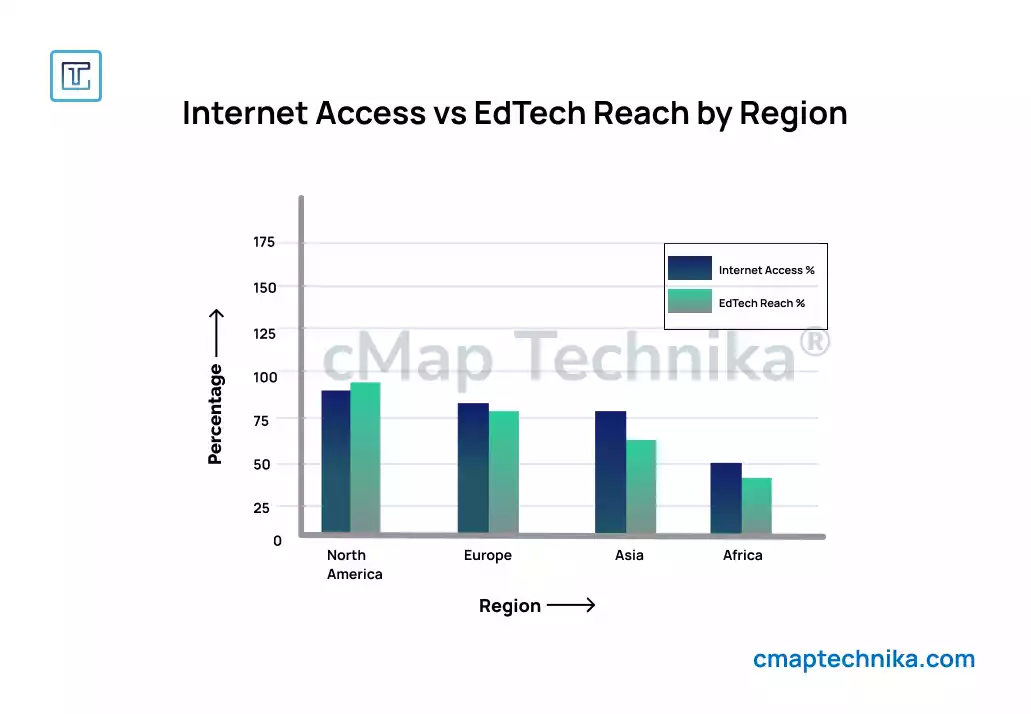In recent years, education technology (EdTech) startups have emerged as transformative players in the global education landscape. By leveraging innovative tools and approaches, these startups are reshaping traditional education models, offering flexible, accessible, and engaging learning experiences. The EdTech revolution is not merely a response to the digital age; it is a critical evolution addressing gaps and inefficiencies in conventional systems.
The Rise of EdTech: A Brief Overview

The EdTech industry has grown exponentially, fueled by advancements in technology, increasing internet penetration, and a global shift toward remote learning, particularly during the COVID-19 pandemic. With investments in EdTech reaching billions annually, startups are introducing platforms and solutions that cater to diverse learning needs across all age groups.
Key drivers of this transformation include:
- Global Connectivity: Enhanced access to the internet and smart devices has democratized education.
- AI and Machine Learning: These technologies personalize learning experiences and provide actionable insights for educators.
- Gamification: Interactive and game-based learning methods enhance engagement and retention.
- Demand for Lifelong Learning: A growing need for upskilling and reskilling has expanded the market for online courses and micro-credentials.
How EdTech Startups Are Changing the Game
1. Personalized Learning Experiences
Traditional education often relies on a one-size-fits-all approach, but EdTech startups are redefining this norm. Platforms like Byju’s, Khan Academy, and Duolingo use adaptive algorithms to personalize learning paths based on individual strengths, weaknesses, and pace. Key features include:
- Data-Driven Insights: Continuous assessment through quizzes and tasks enables platforms to tailor content.
- AI-Driven Recommendations: Suggestions for supplementary resources based on user performance.
- Customized Feedback: Instant feedback mechanisms improve the learning curve and foster self-awareness.
2. Expanding Access to Quality Education
EdTech startups are bridging geographical and economic divides by making quality education accessible. Through affordable subscription models and free resources, learners in remote or underprivileged regions can now access:
- World-class instructors and courses.
- Multilingual and culturally adapted content.
- Offline access features for low-connectivity areas.
For example, platforms like Coursera and edX offer university-level courses at a fraction of the cost, empowering students worldwide to learn from top institutions.
3. Flexible and On-Demand Learning

Unlike rigid classroom schedules, EdTech platforms provide the flexibility to learn anytime, anywhere. This has been especially beneficial for:
- Working Professionals: Platforms like LinkedIn Learning cater to skill development for career growth.
- Homeschooling Families: Resources from startups like Outschool offer structured yet flexible programs.
- Lifelong Learners: Access to niche courses ensures continued personal and professional development.
4. Enhancing Engagement Through Gamification
Gamified learning solutions have proven to increase motivation and retention. Features like leaderboards, badges, and interactive quizzes turn learning into an engaging experience. Examples include:
- Kahoot!: A platform for gamified quizzes that enhance classroom interaction.
- Quizizz: Offers multiplayer learning games tailored to various subjects.
5. Fostering Collaboration and Connectivity
Startups are leveraging collaborative tools to recreate the social aspect of traditional classrooms. Virtual classrooms, discussion forums, and peer-review mechanisms encourage:
- Teamwork Skills: Simulated group projects and collaborative problem-solving.
- Global Networking: Students connect with peers worldwide, fostering cross-cultural understanding.
Challenges and Opportunities in the EdTech Space
While EdTech startups are revolutionizing education, they also face several challenges:

Challenges:
- Digital Divide: Despite advancements, disparities in internet access and digital literacy persist.
- Quality Assurance: Ensuring the credibility and consistency of content across platforms.
- Data Privacy: Safeguarding user data from breaches and misuse.
- Over-Reliance on Technology: The human element in education must not be overlooked.
Opportunities:
- Hybrid Learning Models: Combining traditional and digital methods for optimal outcomes.
- AI Advancements: Further personalization through predictive analytics and virtual tutors.
- Localized Content: Creating resources tailored to regional languages and cultural contexts.
- Corporate Partnerships: Collaborating with industries to align curricula with market needs.
Case Studies of Transformative EdTech Startups
Byju’s: Revolutionizing K-12 Learning
India-based Byju’s offers personalized, engaging learning experiences through video lessons and interactive modules. With a focus on conceptual clarity, the platform has garnered millions of users globally.
Coursera: Democratizing Higher Education
Coursera partners with top universities to deliver affordable, high-quality courses. Its professional certificates and degree programs cater to diverse learners seeking academic or career advancement.
Edmodo: Empowering Teachers
Edmodo provides tools for teachers to create assignments, track student progress, and facilitate communication. It bridges the gap between educators and technology, enhancing classroom efficiency.
The Future of EdTech: What Lies Ahead?
The EdTech sector will continue to evolve, driven by:
- Immersive Technologies: Virtual and augmented reality will redefine experiential learning, particularly in STEM and vocational training.
- AI-Powered Mentors: Intelligent systems will offer personalized guidance, mimicking human mentors.
- Global Standardization: Platforms will collaborate to establish universal benchmarks for online education.
- Increased Focus on Soft Skills: Startups will emphasize emotional intelligence, creativity, and critical thinking to prepare students for the future workforce.
Conclusion
EdTech startups are revolutionizing traditional education models by prioritizing accessibility, flexibility, and engagement. While challenges remain, the opportunities for innovation and growth are vast. By integrating technology with pedagogy, these startups are not only enhancing learning outcomes but also ensuring that education remains a cornerstone of societal progress. As the industry continues to evolve, it holds the promise of transforming lives beyond the classroom, shaping a brighter, more inclusive future for learners worldwide.







